Embarking on Hajj is a profound and transformative experience that requires thorough preparation, especially when it comes to packing the essentials. As a man preparing for this spiritual journey, it’s vital to consider the unique requirements that will ensure your Hajj is performed with both ease and adherence to Islamic guidelines. The list of items you’ll pack is not just about personal comfort but also about fulfilling religious rites with the proper attire and accessories.
Get all the essential gear for your hajj of a lifetime here
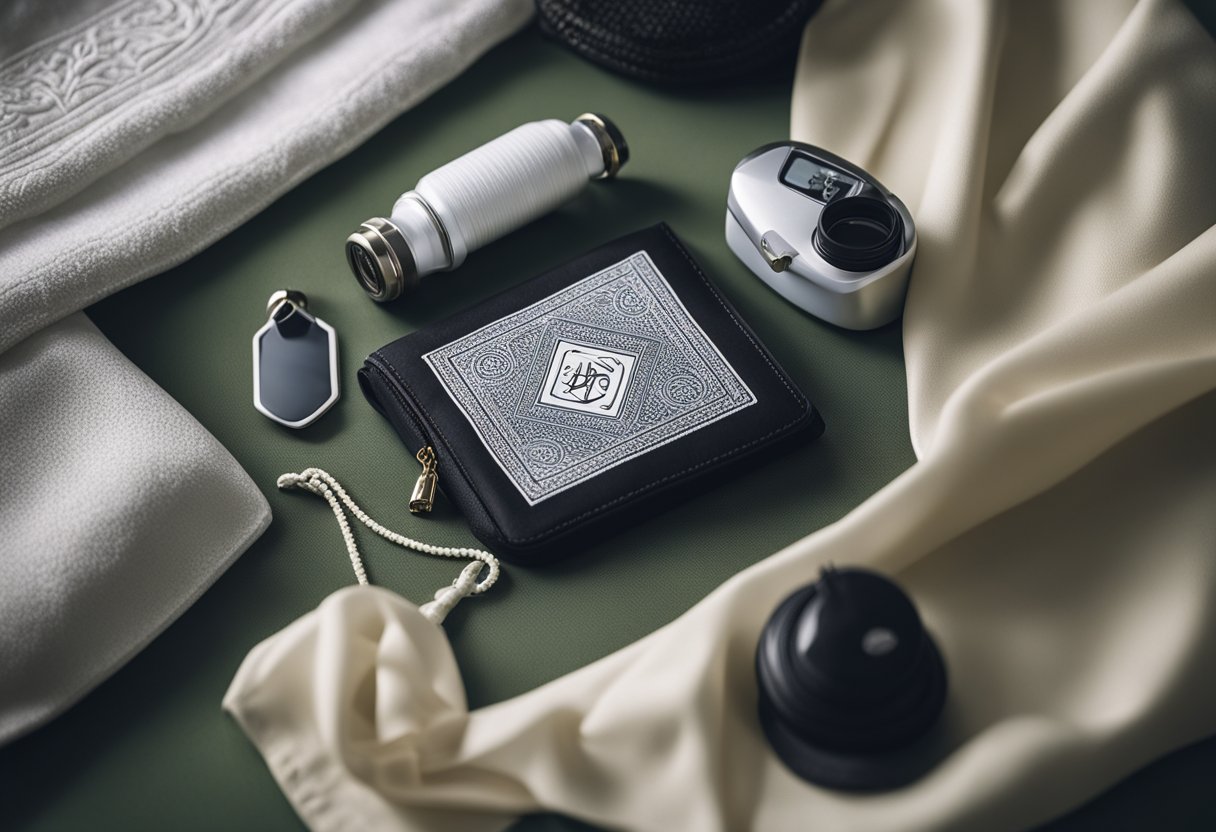
Your primary concern should be the selection of appropriate clothing, namely the Ihram, which consists of two white unsewn sheets that you’ll wrap around your body. Under the state of Ihram, certain restrictions apply, so choosing suitable footwear, like sandals that do not cover the tops of your feet, is also important. In addition to your Ihram, including a travel prayer mat, a Qur’an, and a du’a book or app will keep you spiritually focused while a tawaf counter can be helpful for tracking your progress during the circumambulation of the Kaaba.
Besides religious items, practical necessities such as a well-thought-out selection of everyday clothes that respect the Islamic dress code, toiletries, medication, and electronic devices for communication and navigation are crucial. Remember that while many of these items can be bought locally in Makkah and Madinah, finding everything you need might be easier in your home country and planning will reduce stress, allowing you to concentrate on the purpose of your journey.
Understanding Hajj
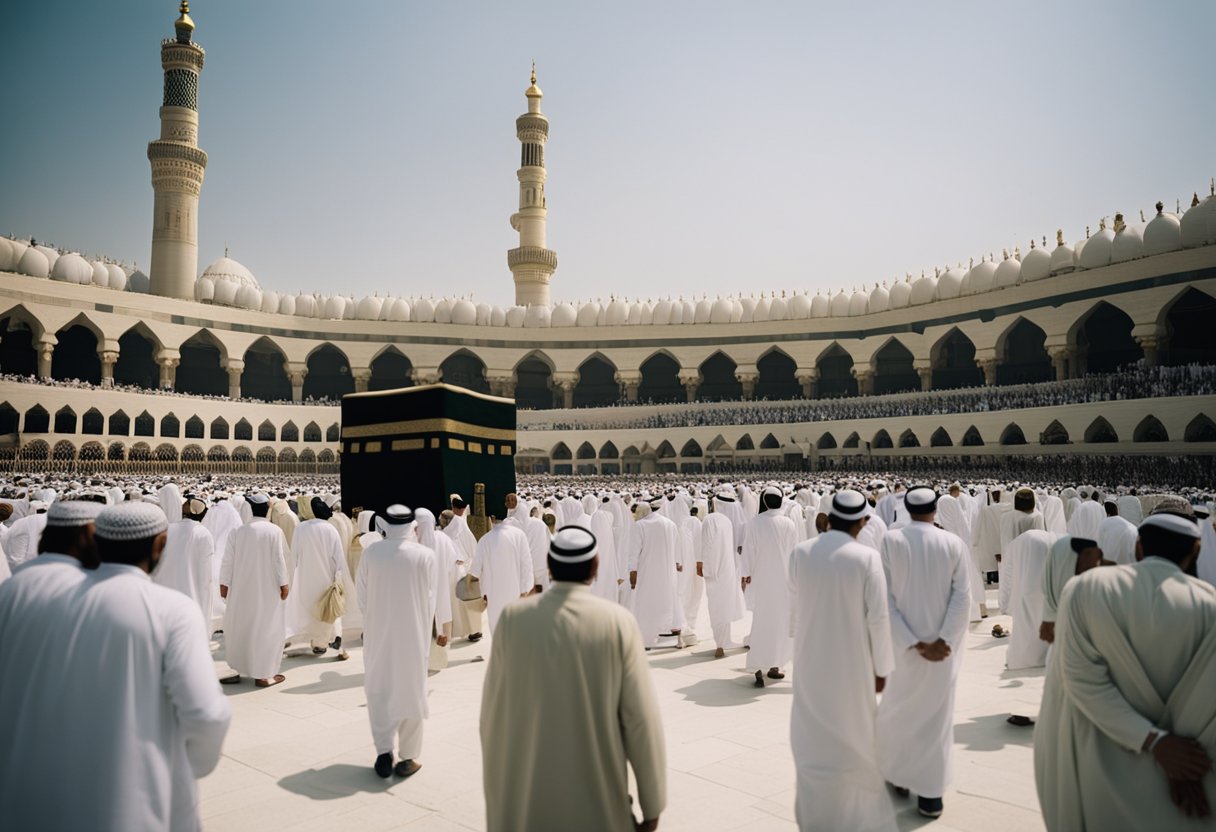
The Hajj is a journey every Muslim aspires to undertake. It’s a pivotal moment in your life and faith, marked by specific rites that must be observed meticulously.
Significance of Hajj for Men
As a Muslim man, performing Hajj is a fulfilment of the fifth pillar of Islam, provided you are physically and financially capable. The pilgrimage serves as a form of spiritual purification, where you stand equal with your fellow Muslims, regardless of your background. Dressed in simple white garments, Ihram, you embody humility and focus on devotion during this time.
Obligatory Acts of Hajj
Ihram: As you enter the state of Ihram, you wear two unstitched white cloths and declare your intention (Niyyah) for Hajj. From this point, you must abstain from certain actions, like cutting your hair or nails.
Tawaf: Upon arrival in Mecca, you must circumambulate the Kaaba seven times in a counterclockwise direction.
Sa’i: You walk between the hills of Safa and Marwah seven times, re-enacting Hagar’s search for water.
Standing at Arafat (Wuquf): The Day of Arafat involves standing in prayer near the Mount of Mercy, from noon till sunset.
Muzdalifah: After Arafat, you spend the night under the sky in Muzdalifah and gather pebbles for the next rite.
Ramy al-Jamarat: You’ll throw stones at three walls, known as the Jamarat, which symbolises the stoning of the devil.
Qurbani (Sacrifice): An animal is sacrificed, and its meat is distributed among the needy.
Tahallul: Marking the end of Ihram, you partially or completely shave your head.
Tawaf al-Ifadah: A final Tawaf is performed post-sacrifice.
These acts are performed sequentially and are fundamental to your Hajj being accepted.
Pre-Hajj Preparations
Before embarking on your Hajj journey, it’s crucial to ensure you are well-prepared both physically and spiritually. Additionally, a solid understanding of the rituals is essential for a fulfilling experience.
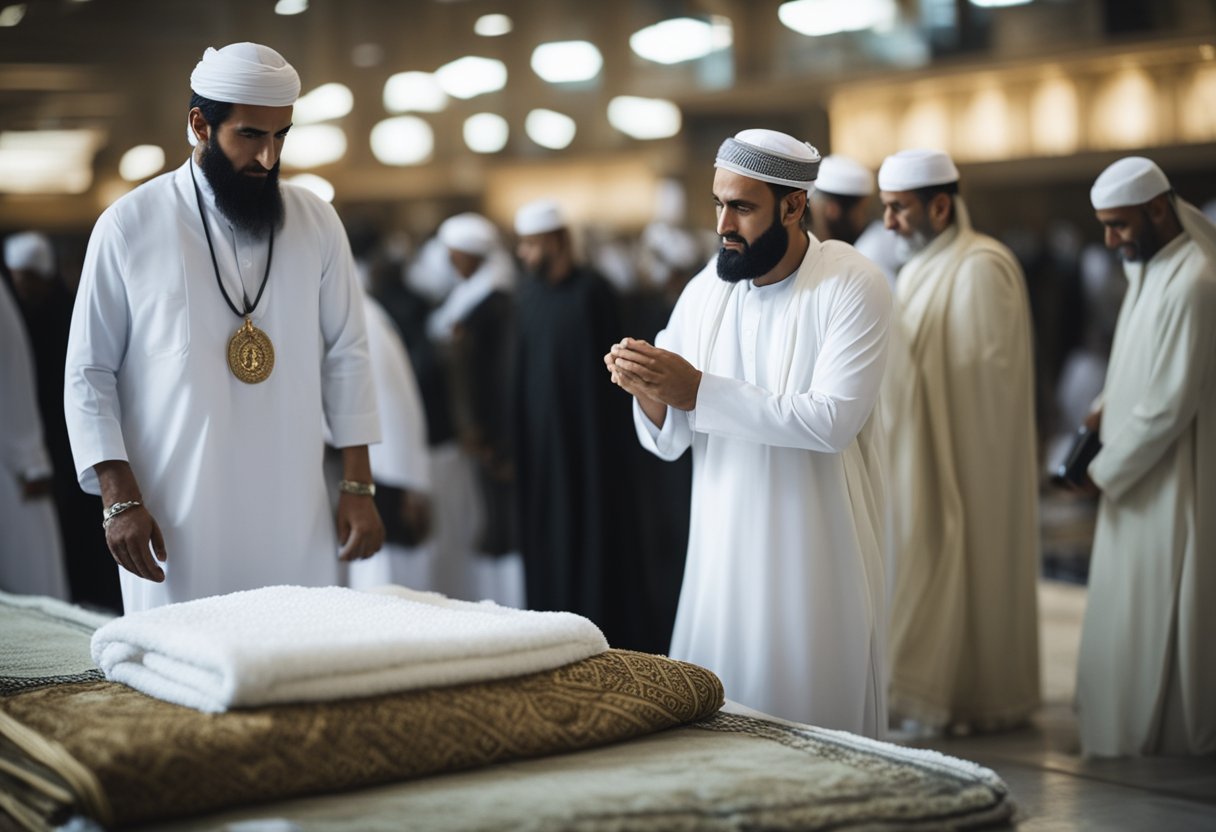
Physical Preparation
Your physical readiness is pivotal for the demanding nature of Hajj. Begin by scheduling a health check-up to ensure you’re fit for the journey. Consider commencing a moderate exercise regime to build stamina, as you’ll be walking long distances. Necessary vaccinations are required, so consult with your travel clinic for the appropriate immunisations.
- Exercise: Regular walking and cardiovascular exercises
- Health Check-up: At least two months prior to departure
- Vaccinations: Meningitis, seasonal flu, and any others recommended for travel
Spiritual Preparation
Spirituality forms the heart of your Hajj experience, hence, increasing acts of worship such as prayer and reading the Qur’an is beneficial. Seeking repentance and setting your intentions purely for the sake of Allah’s pleasure are foundational steps in your spiritual preparation.
- Increased Worship: Daily extra prayers and recitation of the Qur’an
- Seek Repentance: Make a conscious effort to seek forgiveness
- Set Intentions: Clarify your purpose for performing Hajj
Learning the Rituals
Hajj is composed of specific rituals that need to be performed accurately. Ensure you educate yourself about these practices. Acquire an authentic Hajj guide and learn the meanings behind the rituals to enrich your understanding and experience.
- Authentic Guides: Consult reliable Islamic resources or a knowledgeable scholar
- Understand Rituals: Familiarise yourself with the steps of Hajj and their significance
- Practical Workshops: Attend Hajj preparation classes if available
Essential Documents and Finances
Proper preparation of your travel documents and a well-thought-out financial plan are crucial to a smooth Hajj experience. These are foundational to ensuring that your pilgrimage proceeds without unnecessary interruptions or stress.
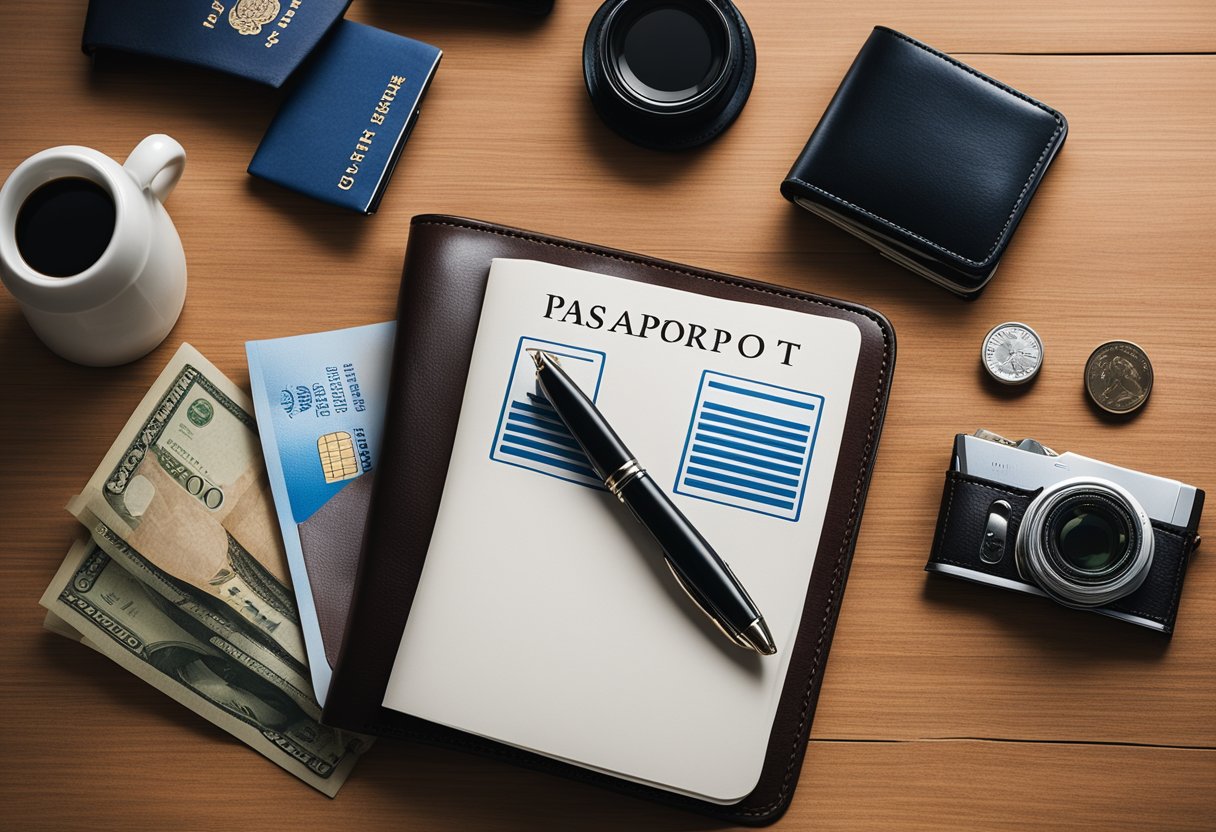
Travel Documents
Your passport should be valid for at least six months beyond your return date. Keep photocopies of your passport and all travel documents, including your flight tickets and hotel booking vouchers, in separate places to safeguard against loss. You are required to have identity proofs and their photocopies, as well as certificates of vaccinations, including the meningococcal vaccine, which is a Hajj requirement.
- Passport
- Photocopies of important documents
- Flight tickets and accommodation confirmations
- Meningococcal vaccine certificate
- Hajj visa and permit
Financial Planning
Prepare a budget for your Hajj and consider carrying a mix of payment methods. Cash is necessary for smaller transactions, but it’s sensible to carry an international debit or credit card for larger expenses or emergencies. Keep track of your spending and make sure you understand the conversion rates and fees for using your card abroad. Additionally, you may want to purchase travel insurance that covers medical expenses, loss, and theft.
- Budget for various categories of spending
- Cash in Saudi Riyals for day-to-day transactions
- International debit/credit card for security and convenience
- Awareness of conversion rates and card usage fees
- Travel insurance for unforeseen circumstances
Ihram for Men
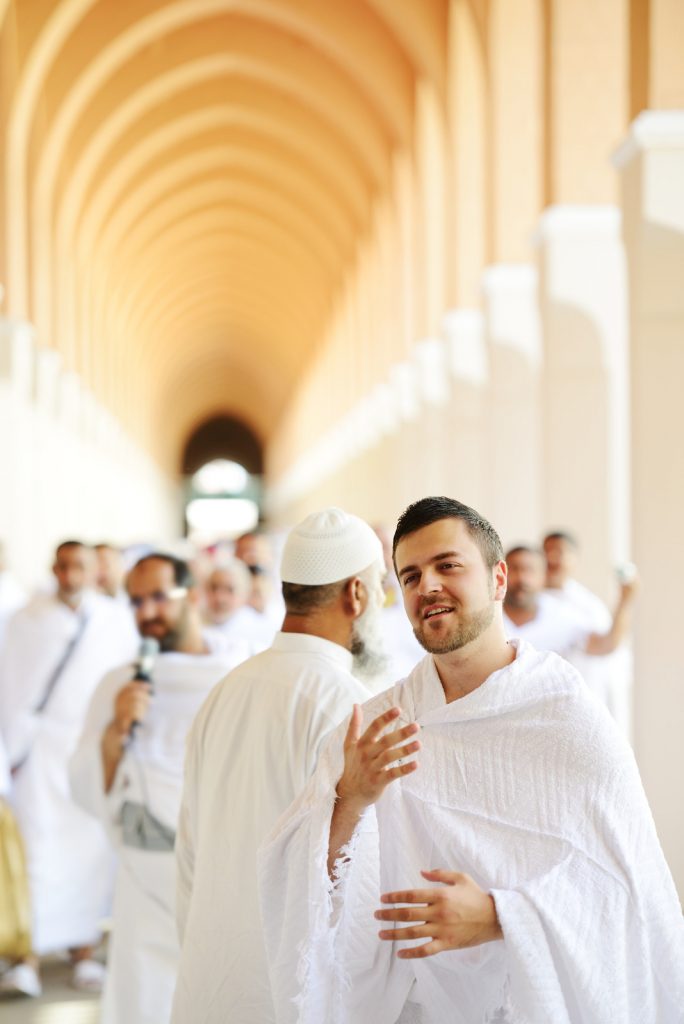
When preparing for Hajj, understanding and adhering to the rules of ihram is paramount. Specific clothing must be worn and certain actions are prohibited during this sacred state.
Understanding Ihram
Ihram is a state of holiness and cleanliness that you must enter before performing the rituals of Hajj and Umrah. While in ihram, you are required to follow a set of Islamic guidelines to help maintain piety and focus on the spiritual journey.
Ihram Clothing
You are required to wear two pieces of white, unstitched cloth. The bottom piece, known as the izar, is wrapped around the waist and covers the body from the navel to the ankles. The top piece, called the rida, drapes over the upper body but leaves the right shoulder uncovered initially during the Tawaf al-Qudum. It’s imperative that the clothing is plain and free of any embroidery or adornments. Sandals or flip-flops should be worn that do not cover the ankle or the majority of the foot.
Footwear Details:
- Ankles: Must remain exposed.
- Upper Foot: The top where laces would normally be should be uncovered.
Ihram Prohibitions
While in the state of ihram:
- Do not use any scented products, including soap and perfume.
- Avoid cutting your hair or nails.
- Do not engage in marital relations.
- Refrain from hunting and cutting down trees.
- Do not engage in conflict or use foul language.
Following these guidelines ensures that you maintain the sanctity of the ihram and perform the Hajj as prescribed in Islamic law.
Packing Essentials
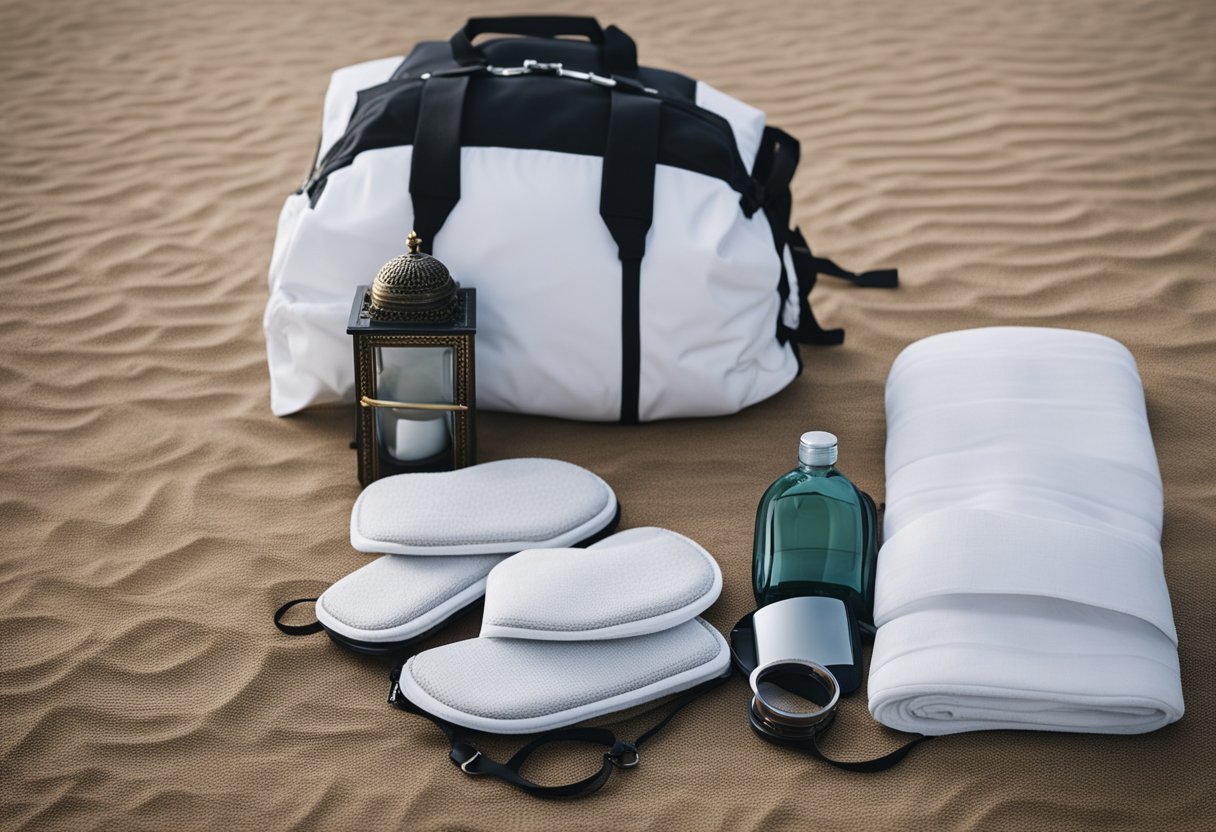
When preparing for the Hajj, it’s vital to consider the climate, the length of your stay, and the activities you’ll perform. Packing efficiently can make your pilgrimage more comfortable and fulfilling.
Clothing and Footwear
- Ihram: Two white cloths for men, unstitched and typically made of cotton for comfort.
- Undergarments: Bring enough cotton undergarments to last for the duration of your pilgrimage.
- Footwear: Lightweight, sturdy, and comfortable sandals that comply with Ihram rules (exposing the top of the foot and ankle).
Personal Care Items
- Unscented Hygiene Products: Opt for unscented soap, shampoo, and deodorant to maintain purity.
- Essential Toiletries: Include a toothbrush, toothpaste, and unscented tissues or baby wipes.
Health and Medication
- First-Aid Kit: Pack a small kit with plasters, antiseptic wipes, and blister plasters.
- Prescription Medication: Carry an adequate supply of any prescribed drugs along with a doctor’s note.
Make sure your first-aid kit is easily accessible during your journey, and keep all liquid medications in a clear bag to comply with travel regulations.
Accommodation and Transport
For a successful Hajj pilgrimage, planning your stay and understanding the available transport options is crucial. You need a comfortable place to recharge and reliable means to navigate the vast area of the Hajj.
Housing During Hajj
During your Hajj pilgrimage, securing accommodation close to the various sites you’ll be visiting can significantly ease your journey. Makkah and Madinah offer a range of options, from budget hostels to luxurious hotels. When booking, consider proximity to the Haram to minimise travel time, especially during the peak days of Hajj. You might find package deals through travel agencies that include stays in Aziziya, a neighbourhood known for its reasonably priced housing particularly during the Hajj season.
Navigating Transport Options
Your transport options during Hajj are varied. Buses are widely available and often included in Hajj packages. They are a common means to shuttle between different rites but can be crowded. For more flexibility, you can consider using the Al Mashaaer Al Mugaddassah Metro, which connects main sites of Hajj. This is a service designed specifically for the pilgrims to manage the crowd efficiently. Be aware that private vehicles have limited access near many Hajj sites, and walking might often be your fastest option. Remember, during Hajj, public transport can experience delays, thus always allow ample time for travel between sites.
Safety and Etiquette
When embarking on the Hajj pilgrimage, it’s crucial to prioritise your safety while adhering to religious and cultural etiquette. This ensures a fulfilling experience that respects the sanctity of the journey.
Personal Safety
- Medical Preparedness: Ensure you have received all required vaccinations pre-departure. Carry a small first aid kit containing essential items such as plasters, antiseptic wipes, and any personal medication.
- Stay Hydrated: The climate in Saudi Arabia can be extremely hot, increasing the risk of heat-related illnesses. Drink plenty of water and carry rehydration salts if necessary.
- Crowd Awareness: Hajj draws millions of people, creating densely crowded conditions. Keep your belongings secure, be aware of your surroundings, and know the location of emergency exits and medical tents.
Behaviour and Etiquette
- Respect Local Customs: Dress modestly, covering the body appropriately. Men should wear the two white unsewn sheets of cloth known as the ihram.
- Quiet Demeanour: Maintain a calm and quiet demeanour, reflecting the spiritual nature of the pilgrimage. Avoid loud conversations and arguments.
- Follow Rules: Adhere to the guidelines set by the Hajj authorities to ensure a smooth and orderly pilgrimage for everyone involved. This includes following the set sequence of rituals without deviation.
Communication and Technology
In the journey of Hajj, effective communication and reliable technology are integral to ensure a smooth experience. You’ll need to navigate, stay in touch, and possibly document your pilgrimage.
Staying Connected
Keeping in constant contact is vital during Hajj, both for safety reasons and to coordinate with your group. Mobile phones are essential; ensure yours is unlocked to use a local SIM card for cost-effective calls and data. Carrying a list of emergency contacts, including those of your group members and local emergency services, is highly advisable.
Useful Gadgets
Invest in a few practical gadgets that can make a huge difference to your Hajj experience:
- Portable chargers: Your phone will be your lifeline, so keeping it charged is crucial.
- Travel adapters: Saudi Arabia uses type G power sockets; bring suitable adapters for your devices.
- Earphones or noise-cancelling headphones: Useful for listening to recitations or blocking out noise to focus on prayers.
Remember to manage these devices responsibly, ensuring they are not a distraction from the purpose of your pilgrimage.
Ziyarah (Visiting Holy Sites)
When you perform Hajj, visiting holy sites, known as Ziyarah, is a pivotal part of your spiritual journey. These visits to historic places offer a deep reflection into the heritage of Islam.
Historical Significance
Makkah (Mecca) and Madinah are the twin pivots around which Ziyarah revolves. The sacred sites have been witness to pivotal moments in Islamic history. In Makkah, performing Ziyarah traditionally includes visiting the Kaaba, the most sacred site in Islam, often followed by the Cave of Hira, where Prophet Muhammad received the first revelation. In Madinah, Ziyarah involves visiting the Masjid Al-Nabawi, the Prophet’s Mosque, and his resting place.
Planning the Visits
Planning your Ziyarah involves a strategic approach to ensure you can visit all significant sites. Start by:
- Creating a Schedule: List down all the sites such as the Kaaba, Mount Ayr, and the Cave of Hira, allocating appropriate times for each visit.
- Understanding Logistics: Consider the distance between sites. For instance, the Cave of Hira is approximately 2 miles from the Kaaba and requires a climb.
- Respecting Rituals: Be well-versed with the rituals and supplications specific to each site to enhance your spiritual experience.
By being organised and respectful, you can ensure a fulfilling Ziyarah during your Hajj.
Get all the essential gear for your hajj of a lifetime here

